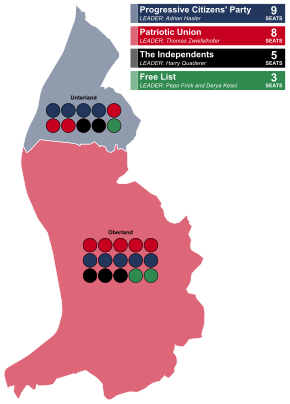
Summary
General elections were held in Liechtenstein on 5 February 2017 to elect the 25 members of the Landtag.
| |||||||||||||||||||||||||||||||
All 25 seats in the Landtag 13 seats needed for a majority | |||||||||||||||||||||||||||||||
| Turnout | 77.82% | ||||||||||||||||||||||||||||||
|---|---|---|---|---|---|---|---|---|---|---|---|---|---|---|---|---|---|---|---|---|---|---|---|---|---|---|---|---|---|---|---|
This lists parties that won seats. See the complete results below.
| |||||||||||||||||||||||||||||||
Background edit
In the 2013 elections the Progressive Citizens' Party lost one seat, and the Patriotic Union lost five seats while The Independents gained four seats, and the Free List gained two seats. This was the first time in Liechtenstein's history that four parties held seats in the Landtag.[1][2]
Electoral system edit
The 25 members of the Landtag were elected by open list proportional representation from two constituencies, Oberland with 15 seats and Unterland with 10 seats. The electoral threshold was 8%.[3]
Campaign edit
The 2017 general election saw the highest number of candidates running in Liechtenstein's history with 71 candidates.[4]
Results edit
The Progressive Citizens' Party lost one seat and the Independents gained one seat. Both the Patriotic Union and the Free List retained all their seats.[5] Voter turnout was 77.8%, down from 79.8% in 2013.[6]
| Party | Votes | % | Seats | +/– | |
|---|---|---|---|---|---|
| Progressive Citizens' Party | 68,673 | 35.24 | 9 | –1 | |
| Patriotic Union | 65,742 | 33.73 | 8 | 0 | |
| The Independents | 35,885 | 18.41 | 5 | +1 | |
| Free List | 24,595 | 12.62 | 3 | 0 | |
| Total | 194,895 | 100.00 | 25 | 0 | |
| Valid votes | 14,768 | 95.82 | |||
| Invalid/blank votes | 645 | 4.18 | |||
| Total votes | 15,413 | 100.00 | |||
| Registered voters/turnout | 19,806 | 77.82 | |||
| Source: Landtagswahlen | |||||
By electoral district edit
| Electoral district | Seats | Electorate | Party | Candidates | Votes | % | Swing | Seats
won |
+/– | |
|---|---|---|---|---|---|---|---|---|---|---|
| Oberland | 15 | 12,814 | Patriotic Union | Christoph Wenaweser Manfred Kaufmann Günter Vogt Thomas Vogt Frank Konrad Rainer Beck[a] Christine Schädler Rainer Wolfinger Karin Rüdisser-Quaderer Dominik Hemmerle Nils Vogt Alexandra Schädler Ernst Trefzer Jnes Rampone-Wanger Gerald Luchs |
48,789 | 34.4 | 0.2 | 5 | 0 | |
| Progressive Citizens' Party | Wendelin Lampert Albert Frick Daniel F. Seger Eugen Nägele Susanne Eberle-Strub Michael Ospelt[a] Marcel Gstöhl Clarissa Frommelt Peter Banzer Martina Haas Andrea Häring Adriana Nentwich-Tomasoni |
47,747 | 33.7 | 5.6 | 5 | 1 | ||||
| The Independents | Harry Quaderer Jürgen Beck Thomas Rehak Ado Vogt[a] Pio Schurti Othmar Züger Pascal Willi Siegfried Sele Isolde Hermann-Jehle Johann Beck Burgi Beck |
26,452 | 18.6 | 3.9 | 3 | 1 | ||||
| Free List | Georg Kaufmann Thomas Lageder Helen Konzett Bargetze[a] Walter Kranz Conny Büchel Brühwiler Richard Brunhart |
18,882 | 11.8 | 2.1 | 2 | 0 | ||||
| Unterland | 10 | 6,992 | Progressive Citizens' Party | Johannes Kaiser Elfried Hasler Johannes Hasler Daniel Oehry Alexander Batliner Norman Walch Bruno Matt Veronika Hilti-Wohlwend Judith Spalt Elmar Gangl |
20,941 | 39.4 | 2.5 | 4 | 0 | |
| Patriotic Union | Violanda Lanter-Koller Mario Wohlwend Guinilla Marxer-Kranz Peter Frick[a] Rainer Ritter Dominik Oehri Peter Büchel Elisabeth Stock-Gstöhl Gustav Gstöhl Rainer Batliner |
16,995 | 32.0 | 1.1 | 3 | 0 | ||||
| The Independents | Herbert Elkuch Erich Hasler Peter Wachter[a] Agnes Dentsch Werner Dolzer-Müssner |
9,449 | 17.8 | 1.0 | 2 | 0 | ||||
| Free List | Patrick Risch Wolfgang Marxer[a] |
5,715 | 10.8 | 0.4 | 1 | 0 | ||||
| Source: Landtagswahlen | ||||||||||
See also edit
References edit
- ^ "2013 election". Inter-Parliamentary Union. Archived from the original on 11 August 2020. Retrieved 11 August 2020.
- ^ "New Independent party rattles Liechtenstein vote". GlobalPost. Archived from the original on 21 July 2016. Retrieved 29 December 2016.
- ^ Article 55 (1) of the Volksrechtegesetz (Law of People's Rights) Gesetze.li
- ^ "State elections 2017: record number of candidates". Liechtensteiner Volksblatt. 25 November 2016. Archived from the original on 4 January 2017. Retrieved 11 August 2020.
- ^ "Liechtenstein populist party gains ground in parliamentary elections". DW News. Archived from the original on 11 August 2020. Retrieved 11 August 2020.
- ^ "The 2017 elections in Liechtenstein: Slight changes and a stronger parliamentary opposition". Party Systems & Governments Observatory. 7 February 2017. Archived from the original on 11 August 2020. Retrieved 11 August 2020.



